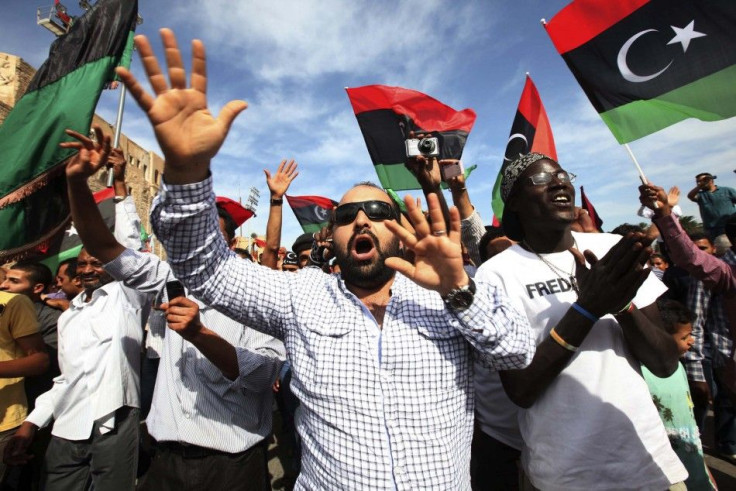Moammar Gadhafi Dead, But Fight for Libya not Over
ANALYSIS

Moammar Gadhafi was killed in Sirte, Libya on Thursday. The former Libyan dictator died from two bullet wounds, to the head and chest, medical examiners determined. His body was transported to Misrata, where he will eventually be buried -- the final nail pounded into the Gadhafi regime's coffin.
The National Transitional Council (NTC) -- Libya's interim, war-time government -- said it would declare victory once all remaining pro-Gadhafi loyalists were expelled from Sirte. While there is thought to be only a few remaining snipers and fighters still bunkered inside the city, it's going to be some time until the revolution is completely concluded.
Clearly, we're very pleased that with Sirte falling and with the pro-Gaddafi forces pretty much driven out of Bani Walid as well, and with Gaddafi himself removed from the scene, Libya is able to move on to the next phase - but there are still challenges in that phase, UK Foreign Secretary William Hague said.
Recent history rightly shows how much work is still left to be done. Egypt's revolt preceded the Libya Uprising, and achieved victory in a much shorter amount of time. Egyptian protestors in Tahrir Square and around the country successfully overthrew Hosni Mubarak after 30 years in power in just one month.
However, as proved by a fiery riot in Cairo last week, Egypt is far from secure. Like Libya, the country was ruled by a temporary tribunal immediately after the revolution. And nine months later, that military tribunal has yet to give up power. While elections are scheduled, the military rulers, headed by Mohamed Hussein Tantawi, are reportedly arresting and beating activists and using force on their own people.
This is shockingly familiar to what happened under Mubarak. Additionally, with the controversial Muslim Brotherhood frontrunners to lead the next government, Egypt could be in line for a conservative, Islamic government. While there is nothing inherent wrong with a non-secular state, it was the oppressiveness of many Islamic regimes in the region that sparked the Arab Spring in January.
The Iraq War is also a pertinent example of the challenges of starting a new political era.
After Saddam’s capture in December 2003, there was a lot of overheated rhetoric from American military commanders that the war in Iraq was over, noted Newsweek Baghdad Bureau Chief Babak Dehghanpisheh.
In many ways, Saddam’s capture in Iraq signaled the beginning of the insurgency. And what was more troubling, Saddam and his Baathist cronies had laid out careful plans for the insurgency, stashing weapons and cash all across the country before the fall of the regime.
While no secret plans are known and most of Gadhafi's inner circle either dead or captured, it is clear that weapons are stashed around Libya. The NTC has discovered caches of chemical weapons, missiles, landmines and rockets, sometimes in bunkers hidden underground. There has been much ado about these weapons falling into the wrong hands.
During her visit to Libya earlier this week, U.S. Secretary of State Hillary Clinton said that the United States would help the NTC dispose of the weapons.
With Gadhafi dead and Sirte effectively captured, the NTC's next task will be the not-so-small project of determining the future of Libya. They will have to draft a new constitution, hold a public election (likely within eight months) and rebuild an entire national infrastructure.
Gadhafi’s death is symbolically important for the rebels, but the fall of Sirte is even more significant for the effect it will have on the future stability of Libya. With the final holdout of the pro-Gadhafi resistance overtaken, the [NTC] can now move to form a transitional government, Stratfor Global Intelligence reported.
But multiple armed groups across the country will demand a significant stake in that government, which will have serious implications for the future unity of the people who heretofore were referred as the Libyan opposition.
Another Iraqi similarity.
The NTC will also have to hold itself accountable if it is to have a truly clean start. Amnesty International is already calling for a thorough and open investigation into Gadhafi' death. Currently, it is unclear if Gadhafi was killed before or after the Sirte fighters captured him, and video of the incident is sketchy, but may show Gadhafi being beaten by excited soldiers.
Moreover, there were reports early in the war that the then-rebel fighters had been committing acts of war against suspected African mercenaries. The new Libyan government must start from a clean, pure place, without any bloody secrets swept under the rug.
Despite the mounting challenges, the death of Gadhafi brings, above all else, opportunity. And the NTC is up for the challenge of creating a new state, free of oppression, with, as Gadhafi (ironically) always said, a true democracy.
Gadhafi's death has given the people of Libya the opportunity to create something much better for themselves, and providing that opportunity is about all the non-Arab world can hope to accomplish in that region, President Barack Obama said Thursday.
We can help, but they have to actually do it.
© Copyright IBTimes 2024. All rights reserved.











